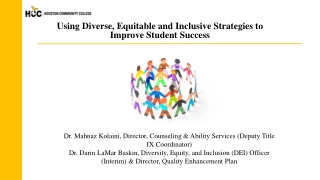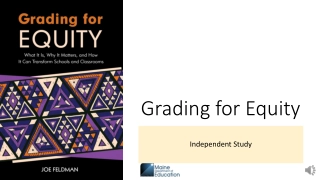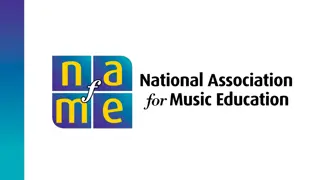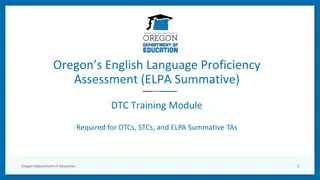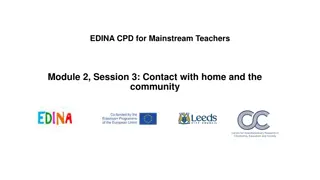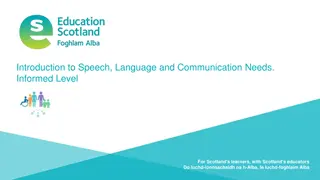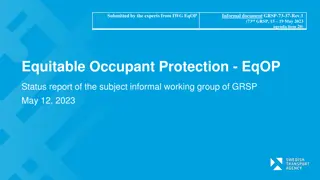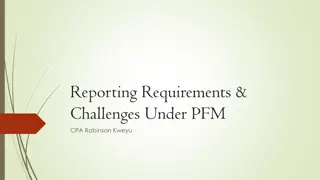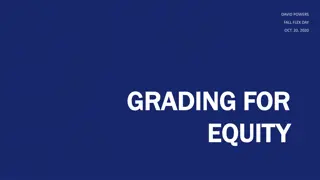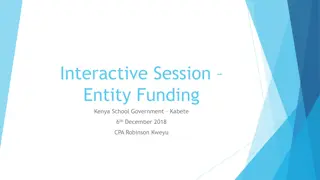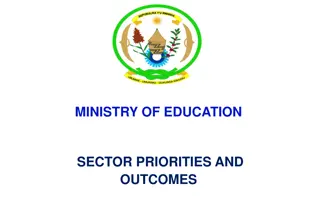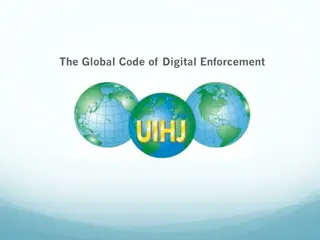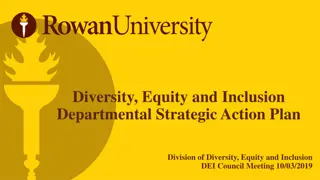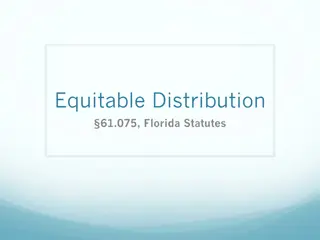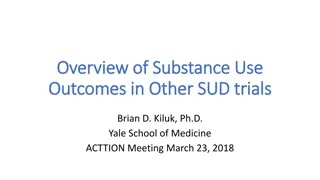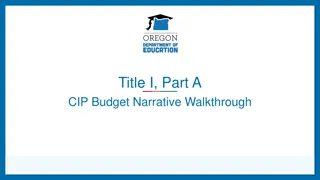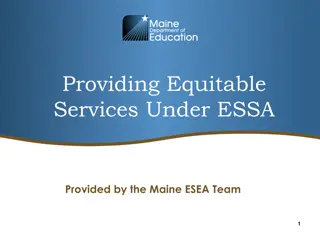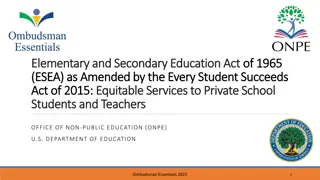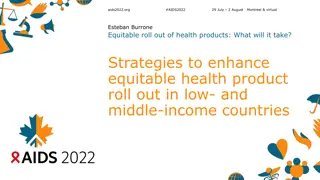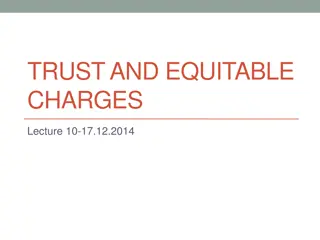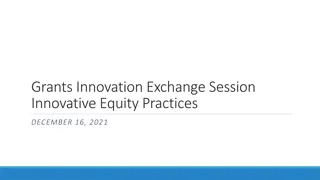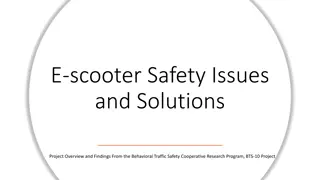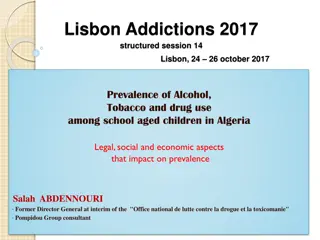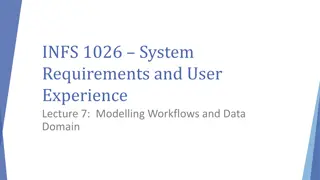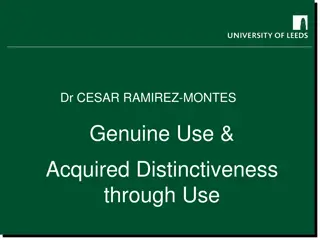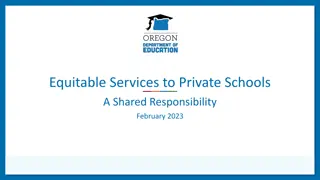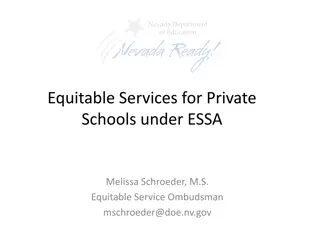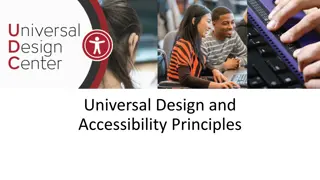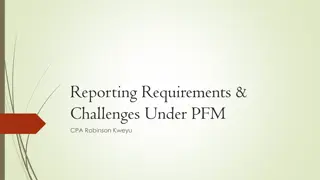Using Diverse, Equitable, and Inclusive Strategies for Student Success
How Houston Community College implements diverse, equitable, and inclusive strategies to improve student success and create an inclusive learning environment.
0 views • 27 slides
Equitable Placement Strategies for Student Success
Explore the impact of AB 1705 on student placement and enrollment, as outlined by the California Community Colleges Chancellor's Office. Join the session to discuss challenges, share successes, and strategize innovations to enhance student success and close equity gaps. Learn about the ASCCC paper o
0 views • 16 slides
Grading for Equity Independent Study Program
Explore the concepts of equitable grading with a focus on historical context, bias recognition, and motivational elements. Join thought partners in studying Joe Feldman's book to transform grading practices for all students. Engage in live facilitated discussions and sessions to delve into the princ
3 views • 11 slides
ICC Renewable Energy Access Workshop Overview
The ICC Renewable Energy Access Plan workshops aim to discuss the implementation of CEJA (Climate and Equitable Jobs Act), focusing on clean energy goals and renewable energy transitions in Illinois. The workshops provide insights, analysis, and opportunities for stakeholder feedback to ensure a jus
3 views • 31 slides
NAfME: Empowering Music Educators for Equitable Access
Collaborate with NAfME, a supportive community advocating for equitable music education access. Experience a diverse association where everyone is valued, heard, and included in their musical journey. Discover the transformative power of music, connecting people across cultures and time, fostering c
2 views • 19 slides
Equitable Services for Private School Children and Teachers
The Elementary and Secondary Education Act of 1965, specifically Title VIII, Part F, outlines the provision of equitable services for eligible private school children, teachers, and other educational personnel. This non-regulatory guidance emphasizes the importance of ensuring fairness and support f
4 views • 32 slides
Oregon ELPA Summative Assessment Training Module
The Oregon ELPA Summative Assessment is designed to measure English language proficiency in reading, writing, speaking, and listening for students with English learner status. This training module covers topics such as scheduling, administration, key elements, best practices, and the purpose and use
3 views • 19 slides
Enhancing Education Through Family and Community Engagement
Inclusive and equitable education is achieved through effective family and community engagement, which positively impacts student achievement. Engagement dimensions include providing a secure environment, intellectual stimulation, and active participation in school activities. Building equitable rel
0 views • 8 slides
Understanding Speech, Language, and Communication Needs in Scottish Education
Communication is a vital life skill crucial for various aspects of life, from relationships to job interactions. Speech, Language, and Communication Needs (SLCN) encompass difficulties in fluency, forming sounds, sentence formulation, understanding, and social language use. Almost 20% of the populat
1 views • 8 slides
Progress Report on Equitable Occupant Protection Working Group
The Informal Working Group on Equitable Occupant Protection (IWG EqOP) has made significant strides in enhancing the safety and protection of a diverse population, focusing on passenger car occupants. The IWG's workplan includes tasks related to regulatory changes, addressing diversity issues, and a
0 views • 12 slides
Public Financial Management Challenges and Principles by Robinson Kweyu
Public Financial Management under PFM CPA Robinson Kweyu involves reporting requirements, legal documents, institutional players, and principles like openness, accountability, and public participation. It emphasizes the responsible and equitable use of public resources to promote a transparent and e
0 views • 11 slides
Equitable Grading Practices: Pillars, Zero Policies, and Minimum Grading
Explore the three pillars of equitable grading: accuracy, bias-resistance, and motivation. Learn about the impact of giving zeros on student grades and discover alternative approaches. Delve into the concept of minimum grading and how adjusting grading scales can enhance student engagement and succe
1 views • 48 slides
Urban Land Management and Infrastructure Delivery: Challenges and Solutions
The analysis delves into various aspects of urban land management, including growth analysis, property market overviews, economic statistics, and infrastructure requirements for green hydrogen in Lüderitz. It highlights the need for a national urban land framework to ensure secured, equitable, affo
0 views • 9 slides
County Government Revenue Sources and Allocation in Kenya
The county government revenue in Kenya is sourced from various avenues such as property rates, entertainment taxes, and service charges. Equitable share forms a significant part of this revenue, allocated based on a formula developed by the Commission on Revenue Allocation. The funds given through t
0 views • 14 slides
Education Sector Priorities and Outcomes in Rwanda
The Ministry of Education in Rwanda aims to transform citizens into skilled human capital through equitable access to quality education. Sector priorities include enhancing learning outcomes, strengthening teacher development, promoting STEM education, increasing ICT use, improving infrastructure, a
0 views • 13 slides
The Global Code of Digital Enforcement: Embracing Innovation in Justice
The Global Code of Digital Enforcement introduces modern concepts and principles to govern the use of digital technology in enforcing court decisions. It promotes a balanced enforcement system by addressing the impact of digitalization on enforcement professionals and offering guidelines on e-enforc
0 views • 18 slides
Rowan University DEI Strategic Action Plan Overview
Rowan University emphasizes diversity, equity, and inclusion (DEI) through its strategic action plan, aiming to create a more inclusive and equitable campus community. The plan involves assessing departmental strengths and areas for improvement, setting goals and objectives, and engaging all faculty
1 views • 15 slides
Private Schools: CARES Act Equitable Services Overview
This session introduces and discusses the implications of the CARES Act Equitable Services for private schools, including a timeline of events, court decisions, and implications for districts and private schools. The presentation covers the requirement for LEAs to provide equitable services to non-p
2 views • 12 slides
Understanding Equitable Distribution in Florida
Equitable distribution in Florida, governed by statutes 61.075 and 61.076, determines the fair division of marital assets and liabilities in divorce cases. Key considerations include identification, valuation, distribution presumption, and justification for unequal distribution. Assets are classifie
0 views • 28 slides
Understanding Equitable Services to Independent Schools
Explore the guidelines for providing federal education aid to students in need attending independent schools, as mandated by the Elementary and Secondary Education Act. Learn about eligibility criteria, consultation processes, and funding allocation. Discover the complexities of Title I eligibility
0 views • 46 slides
Substance Use Screening, Risk Assessment, and Disorder Diagnosis Guidelines for Adults
This clinical guideline program aims to increase identification of unhealthy substance use among New York State residents and improve access to evidence-based interventions. It provides guidance on substance use screening, risk assessment, and promoting a harm reduction approach for substance use di
0 views • 19 slides
Alcohol Use Outcomes in Substance Use Disorder Trials
This presentation provides an in-depth overview of assessing alcohol use outcomes in substance use disorder (SUD) trials. It covers various assessment methods, common outcomes like percent days abstinent and heavy drinking days, preferred outcomes such as percentage of heavy drinking days (PHDD), an
0 views • 19 slides
Understanding Title I, Part A CIP Budget Narrative Requirements
This walkthrough explains the purpose of Title I, Part A funds, focusing on providing equitable education opportunities and addressing achievement gaps for students in need. It covers important aspects such as the Supplement Not Supplant rule, federal funds timeline, and consultation for equitable s
0 views • 26 slides
Equitable Services Requirements and Guidelines under ESSA
Equitable Services Requirements and guidelines under ESSA outline the responsibilities of education officials, ombudsman, and private school administrators to ensure fair distribution of federal funds. The ESEA Team in Maine works to uphold Title I, Part A, Migrant Education, Teacher Quality, Englis
0 views • 56 slides
Education Act of 1965 and Equitable Services for Private School Students
The Elementary and Secondary Education Act (ESEA) of 1965, as amended by the Every Student Succeeds Act in 2015, ensures equitable participation of private school students and teachers in federal education programs. The Office of Non-Public Education (ONPE) oversees this initiative, providing resour
0 views • 30 slides
Enhancing Equitable Health Product Roll-out in Low- and Middle-Income Countries
Strategies to enhance equitable access to health products in low- and middle-income countries will be discussed at the AIDS 2022 conference, focusing on key factors such as availability, acceptability, affordability, accessibility, and quality. The Medicines Patent Pool aims to increase access to in
0 views • 14 slides
Understanding Trust and Equitable Charges in Property Law
Trust and equitable charges in property law involve a legal obligation where the property holder manages the property for the benefit of another person. This trust relationship consists of elements like legal title, trust property, and beneficiaries. The creators of a trust can be referred to as set
0 views • 25 slides
Grants Innovation Exchange Session on Equitable Award Practices
Laura Watson and Lynn Rhinehart from the Department of Labor, along with Lynn Overmann from the USDA, discuss the impact of eligibility criteria on equitable outcomes of awards. They also share innovative practices related to the recent Controller Alert and OMB guidance, emphasizing the inclusion of
0 views • 12 slides
E-scooter Safety Issues and Solutions Project Overview
E-scooter safety research project BTS-10 investigated usage patterns, safety concerns, injury data, and safety management practices. The project aimed to identify key safety issues, current practices, and future research needs, emphasizing the importance of a safe and equitable transportation system
0 views • 38 slides
Prevalence of Alcohol, Tobacco, and Drug Use Among School-Aged Children in Algeria
This study presented at the Lisbon Addictions 2017 conference discusses the prevalence of alcohol, tobacco, and drug use among school-aged children in Algeria, highlighting legal, social, and economic factors influencing the use. The data sources and statistics on drug prevalence use in Algeria, as
0 views • 8 slides
Modelling Workflows and Data Domain in System Requirements and User Experience
In this lecture, the focus is on modelling workflows and data domain in the context of system requirements and user experience. The topics covered include recap of use cases, use case diagrams, descriptions, events initiated by stakeholders, defining elements for each use case, use case diagrams, an
0 views • 56 slides
Understanding Genuine Use and Acquired Distinctiveness in Trademarks
Exploring the concept of genuine use and acquired distinctiveness in trademarks, this content delves into the general principles and specific regulations in the EU, UK, France, and Germany. It discusses the importance of maintaining continuous use of a trademark and the consequences of non-use, as w
0 views • 37 slides
Equitable Services to Private Schools: Shared Responsibility and Requirements
Equitable services to private schools involve federal programs supported by tax dollars, allowing all children and teachers access to various educational programs. Private schools must be not-for-profit to qualify. Consultation plays a crucial role in reaching agreements on providing equitable and e
0 views • 17 slides
Understanding Equitable Services for Private Schools under ESSA
Equitable Services for Private Schools under ESSA ensures fair educational benefits for private school children, teachers, and personnel compared to public schools. Requirements cover various programs like Title I and Title IV, with an ombudsman role to enforce compliance. ESSA mandates separate pro
0 views • 29 slides
Universal Design and Accessibility Principles Overview
Learn about the importance of universal design and accessibility principles in creating technology that is usable by everyone, regardless of abilities. Discover the key principles such as equitable use, flexibility in use, simplicity, perceptibility, error tolerance, low physical effort, and appropr
0 views • 20 slides
Public Financial Management: Reporting Requirements and Challenges
Public Financial Management (PFM) involves rules and processes used by the government to mobilize revenue, allocate funds, and more. This content explores the reporting requirements and challenges faced under PFM, highlighting key principles, legal documents, and institutional players involved in th
0 views • 11 slides
Inviting the UK's Rural Community to Showcase Contributions at COP29
Ahead of COP29, the UK's rural community has the opportunity to shine a spotlight on their role in a just, equitable, and resilient net-zero economy. With a focus on agriculture and land use, the event offers flexible formats for hosting engaging sessions, allowing participants to share their expert
0 views • 5 slides
Tips for Being a Supportive and Equitable Debate Judge
When judging a debate, it is crucial to be supportive, equitable, and respectful of all participants. Providing opportunities for debaters to state their pronouns and important information, avoiding favoritism, and embracing diversity are key aspects of being a good judge. Actively listening, taking
0 views • 39 slides
Addressing Disability Discrimination Among Graduate Students: A Call to Action
This article sheds light on disability discrimination among graduate students and emphasizes the need for action to improve their overall experience. It highlights the importance of providing accommodations, support services, and auxiliary aids to ensure equal access to university programs and facil
0 views • 34 slides
Enhancing Mental Health Outcomes in Long-Term Conditions through IAPT Services
IAPT services focus on measuring outcomes on a session-by-session basis to ensure equitable use and monitor progress towards recovery. By including those with long-term conditions (LTCs), these services aim to address under-representation, improve outcomes, and reduce healthcare costs. Through patie
0 views • 9 slides
